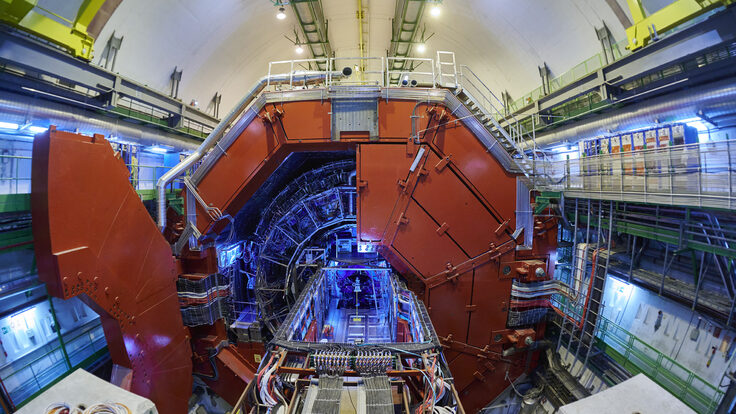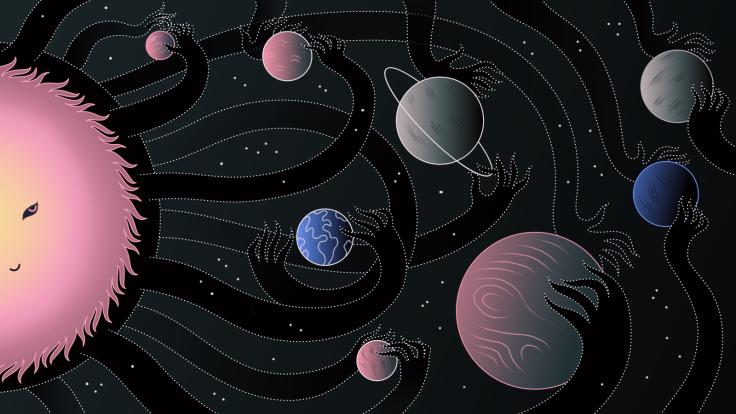Strangers in the dark: they meet, make contact, and break away with force, careless of what they leave behind. At midnight each night, snapshots of these frenzied chance encounters are collected for curious eyes. In the morning, those onlookers reconstruct the story that each image tells, tracing the mysterious paths born from a fateful meeting.
This is the CMS exotica hotline, and no, it’s not a 900 number.
Those snapshots are event displays, pictorial descriptions of proton collisions in the CMS detector, selected from the previous 24 hours. Every morning, 10 CMS collaborators volunteer to review between 20 and 100 hotline displays to get a sneak-peek at the latest data. By picking out the most unusual events first, CMS physicists hope to learn more about how the detector is functioning and spot exotic physics.
Exotic physics is the physics that breaks rules and defies expectations. This is the realm beyond the Standard Model and even beyond supersymmetry —the domain of the unstable and excited, the string balls, black holes, and extra dimensions. The CMS group devoted to seeking out these events is called the exotica group, and the hotline supports their search.
Every morning, CMS collaborator Tulika Bose of Boston University, a lead developer of the hotline, scans event displays to parse potential physics from peculiar equipment signals. She explains that the hotline offers an open-minded way of developing new search criteria for exotic events.
“New physics at the LHC may have none of the characteristics that our search groups are looking for, so this helps cover the area of the unknown,” Bose says.
The concept is not without controversy. Event displays are traditionally created only after extensive analyses suggest an event deserves a closer look. The exotica hotline, in a sense, works backwards, using a graphic display before numerical analysis.
“The hotline is not to replace the analysis,” says Massimiliano Chiorboli, a CMS collaborator who co-designed the software for the exotica hotline. “CMS is a very big community and a lot of people are working on analysis. We want to provide more information to those analysts and show the community when we recognize something special.”
The inspiration for the project comes from a previous CERN experiment on the Super Proton Synchrotron. In the ’80s, the UA1 experiment’s control room kept a bell that collaborators would ring at the first hint of a special event. A similar early warning system was later used by experiments at DESY’s HERA and Fermilab’s Tevatron collider. This inspired Chiorboli, of the University of Catania and INFN, and CERN’s Maurizio Pierini to develop a similar system to alert their collaborators.
At midnight each night, Chiorboli and Pierini’s program collects express-stream events from the previous day. The express-stream data is a subset of the total collected CMS data, assembled and reconstructed into recognizable physics events for those who need to quickly check the detector’s condition. Displays for the hotline are filtered to include only the most convincing and interesting events.
Around 9 a.m., the hotline software sends an automated e-mail summarizing select displays. The 10 volunteers who receive this e-mail come from all areas of the collaboration. They critically examine the hotline to decipher what they see. Volunteers are also on the lookout for strange events that could be misleading or distracting in later analysis.
Thus far, the hotline has called attention to unusual detector signals and rare but familiar physics, such as Z and W bosons. That makes this an ideal time to fine-tune the hotline’s filters, a task that Alexey Ferapontov of Brown University, who looks for exotic multi-jet events, assists.
“The exotica hotline cannot be treated as an analysis, but it gives us valuable experience,” Ferapontov says. “The whole CMS collaboration can profit from this and there is always the possibility that we find something really new and unseen before. This makes participation very fun!”
The exotica hotline offers new thrills to CMS collaborators in their physics searches—and what’s more, they won’t get in trouble for watching at work.






